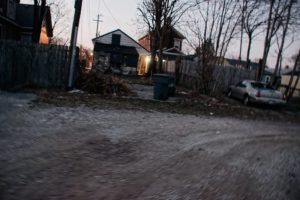Assistant Editor Madeleine Wattenberg: At first glance, Lis Sanchez’s “Next to Us: Sonnets, Divided” (Issue 16.2, due out in November) is a walking poem. The speaker strolls through a cul-de-sac at dusk and observes newly lit windows framing scenes of domesticity, neighbors’ interior lives. Close by, “bulldozers / have knocked down the tall oaks, the hickories, / the poplars with their orange-and-lime cups / suckling spring bees.” The image of the day’s destruction foreshadows what soon unfolds.
Sanchez crafts the neighborhood’s windowed scenes with unsettling vocabulary, until violent description becomes violent act: “a blade unsistering / the tender flesh of salmon” leads to “my neighbor slapping his hembra with hands // like obscenities.” To heighten the tension, Sanchez builds a quickening drumbeat backdrop, so that “a slow tapping / of bongos” is joined by “hammering / hooves” and the “neighbor’s fist [ . . . ] like a mallet.”
The poem is two paired sonnets, a diptych. Though tightly bridged by the first sonnet’s closing couplet, which syntactically continues into the second sonnet’s opening line, the poem is halved by an asterisk, a wide disjunction across which the reader’s eye must leap: “In the cul-de-sac / lawns strobe beautifully with tonight’s newscast // * // from a TV screen so wide I can see / the faces the networks have aired all day.”

The form emphasizes what’s suggested by the poem’s title, and Sanchez continues to complicate the distance, or division, between the poem’s speaker and the viewed events. Through mediums of separation (the window, the TV screen), the speaker watches “two women racing from armed ICE agents.” “Glimmers of ice” that appeared in the poem’s first half, used for chilling whiskey, reappear in the second half as the ICE agents chasing the women, a grandmother in a wheelchair pushed, then carried, by her granddaughter.
In “Next to Us: Sonnets Divided,” Sanchez skillfully considers what it means to be both simultaneously inside and outside acts of violence. Despite active verb construction, Sanchez’s speaker is largely passive; “I walk past,” “I can see,” “I stand amid,” “I hear, “I see.” But the poem also begins with collective ownership (“All day behind our houses”) and ends with it too (“I see / our country darken, a stutter and slam inside”).
The neighborhood has become the whole country slamming its doors to violence outside its borders, but also masking the violence within them. Government-sanctioned violence is linked to domestic violence. By the final couplet, we are all implicated by what has occurred; harms committed by our neighbors, our country, the harms felt as constant witnesses of violence of one’s people, the harms we commit as watchers of violence.
At second glance, this poem is still a walking poem. But the poem necessitates that readers reconsider the ethical responsibilities of moving through this world.










